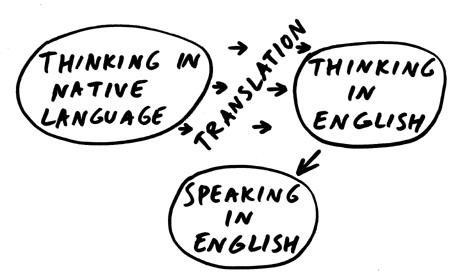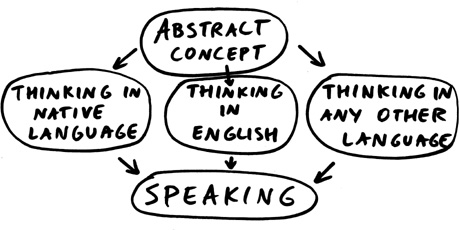Most students complain they cannot speak English fluently and they cannot think in English.
“It’s not easy!”
“I don’t have enough English words to speak!”
“I always think in my native language then translate.”

Many advanced students also translate from their native language before speaking English, but they do it very fast. However, if you can develop the habit of thinking in English, this will help you speak more easily and fluently.
Do you know that you can learn to think in English even if you are a beginner?
What are the benefit of thinking in English when you speak?
- You have faster response
- You speak English more naturally
- You can speak fluently in conversation without your problem with vocabulary words.

This is the best way to improve your spoken English in 4 steps:
Step 1 – Thinking in individual English words
The first step is to think of individual words that you use daily. Let’s see these examples,
When you are at home, you can think of these English words:
- door
- book
- read
- table
- chair
- sofa
- go
- window
- kitchen
- bedroom
When you go to school, you can think of these English words:
- teacher
- student
- notebook
- pen
- friend
- class
- pencil
- blackboard
- lesson
You can practice to think of the individual English words for everything you see, you hear and you do.
Step 2 – Thinking in complete English sentences
When you are familiar with thinking a lot of English words in your mind, you can go to step 2 and practice to think in complete English sentences.
When you are listening to music, you should say in your mind, in English of course.
- I am listening to music
- This piece of music is beautiful
- I like classical music
When you are watching a football match, you can think.
- The match is very interesting
- Team A will win this match
- The player number 10 is the best one.
- The score is 2-1
You only need to make simple sentences. The most important thing is you think in English and practice with complete sentences.
Step 3 – Self talk in English
In this step, you will imagine having a conversation with someone in your real life.
For example, you go to book store. You ask the seller for a book about title, price… You also make bargain, pay and you leave. After you leave, try to think of how you would say it if you were speaking English with the book seller.
- Can I have a book by author ABC please?
- How much is this book?
- Can I pay by credit card?
- Do you have a paper to wrap the book?
This will help you get used to using English in real-life situations – even though you are only thinking and not speaking. It is “mental practice” and if you do this consistently, you will develop the ability to do almost anything you need in English.
Step 4 – Silent conversations with yourself
This step is suitable when you have some time, such as when you are driving to work, walking to school, waiting in a queue… Think about a story in the past or describing what is happening around you at the moment or you can think of your plan in future. Then you tell the story in English in your head.
- “This is a sunny day, I’m going to go to the park today. I’m hungry, I’ll make something to eat first. Then I will call my friend to go out with me. I will wear casual dress today. I think my friend will like it ”
- “My English class was quite empty yesterday. There was a big typhoon. It caused some traffic jams and a lot of trees fallen down. I got wet all the way to my class. I was very cold and I had to leave the class early for home.”
You are talking with an “imaginary” English-speaking friend in your head. You can take your time to create better sentences and use all your vocabulary without the pressure of a real conversation.
Think in English? You can do it!
I hope you can see that you don’t need to be an advanced English learner to think in English – you can begin today. Practice one of these four steps this week to speak English fluently. I think you’ll be pleasantly surprised how quick you improve your spoken English!
It’s a excellent article, I go to practice following your steps.
thanks my friend
Therefore, all education must have to focus teaching some sort of good English language to their students and also dealing with that good languages term.